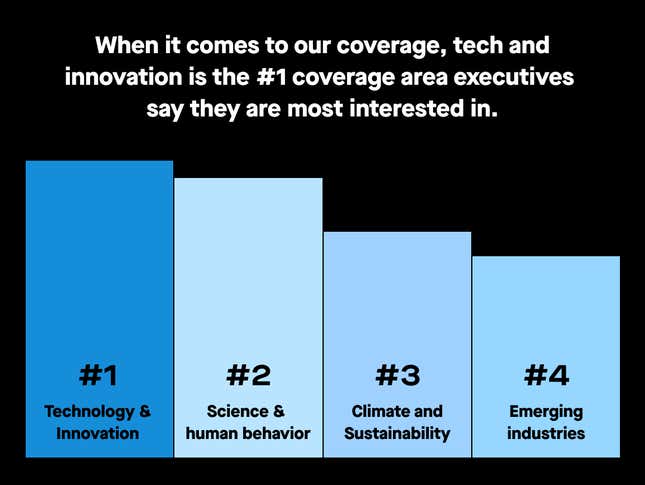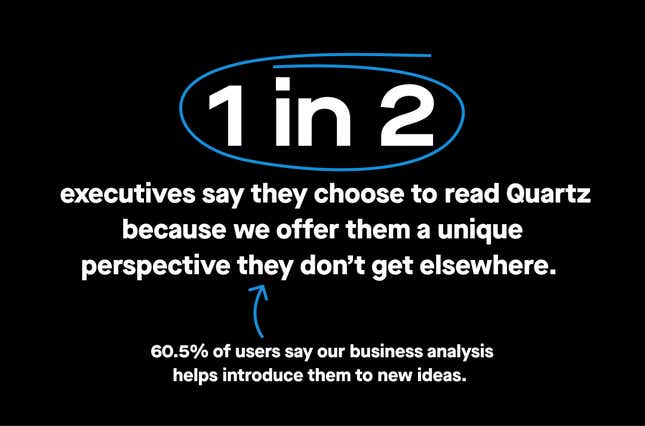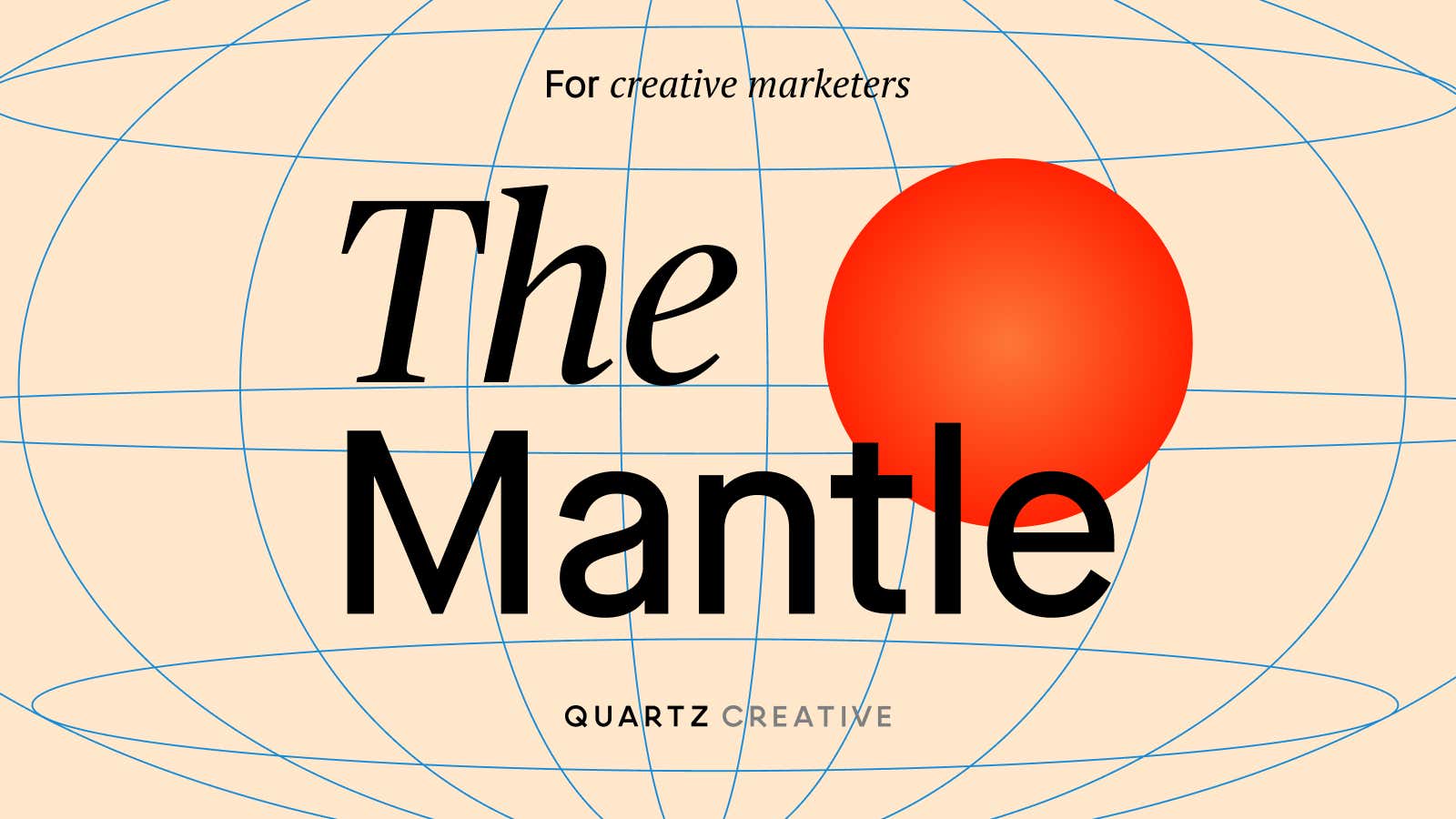With the conclusion of Davos, the annual gathering of business and policy leaders, CEOs have been all over the news, making this a ripe moment for marketers to deepen their understanding of the changing roles and responsibilities of the C-suite.
Smart marketers already know that business is the biggest driver of innovation in a world that keeps moving faster. Global executives sit at the heart of these transformations, and it’s their ideas, values, and actions that help to accelerate positive change within industries and wider society.
According to Edelman’s Trust Barometer 2022, 61% of people believe business is the most trusted institution—outweighing both government and media. Business leaders have a unique opportunity to build on this trust and champion mission-driven initiatives, speak out on hot-button issues, and humanize business objectives.
At Quartz, we’ve been talking to global executives for almost a decade: helping them navigate the financial forces of change through our analysis and guiding them to be modern leaders with our management advice. Through their reporting, our journalists recognize how company leaders can and should play a greater role in their communities and the world.
We’re starting to see this play out. In our own recent survey of more than 1,000 executives around the world, we found that they are 1.47x more likely to put profit and purpose on equal footing.
In this issue of The Mantle, we’ll unpack insights about the next generation of leaders, how they impact marketing, the best ways to leverage these influencers, and a recap of the C-suite event of the year.
—Bob Maund, VP of partnerships, Quartz
Meet the next-gen C-suite
They are cultural influencers
The definition of an influencer is expanding. CEOs are no longer just measured on their quarterly shareholder returns reported while sitting in their corner office. They are becoming societal trendsetters, inspiring change in their own orgs, industries, and beyond.
Whether it’s taking a stance on gun violence, coming together to call for an end of the death penalty or stepping down from a leadership role to prioritize mental health, some CEOs aren’t afraid to use their position of power as a platform.
They have the power to mold minds and hearts
A CEO is no longer just an invisible decision-maker, but the public face and beating heart of a company. They are increasingly expected to invest in values that match their employees and demonstrate personal trustworthiness to their customers, all while generating profit and championing a bigger purpose.
They have to navigate technological and existential forces
Reading the tea leaves of global executives who read Quartz, CEOs have to focus on accelerating technological shifts (and the business opportunities that come with innovation) as well as climate change (and the growing consumer expectations around sustainability).

Quartz is focused on supporting leaders through these complexities. Everyday our global newsroom keeps leaders up to speed on both the rapidly expanding climate economy and emerging technologies like the immersive internet through our intersectional, analysis-driven Obsessions.
By the digits
According to Edelman’s latest Trust Barometer (see TL:DR, The Trust Top 10), consumers have growing expectations of the top brass.
80% believe global CEOs should be personally visible when discussing public policy with external stakeholders or work the company has done to benefit society
60% want CEOs to speak out about controversial issues
Smart CEOs are responding to these demands. According to Quartz’s recent Global Executive Survey, our C-suite readers are:
1.2x more likely to be interested in industry trends and forecasts
1.4x more likely to be interested in reading interviews
1.2x more likely to be interested in attending virtual events

How the C-suite is impacting marketing
A marketing strategy which leverages the voice and values of a CEO can enhance a company’s brand awareness, employee consideration, and cultural relevance. Here’s why (and how marketers can respond):
CEOs can command attention
Bringing insights from a place of lived leadership experience, a CEO can benefit a business by creating a rallying cry for their teams, giving back to their community, and inspiring fellow CEOs to follow suit.
For example, Marc Benioff, often called the “activist CEO” of Salesforce, takes bold stands on homelessness in San Francisco and champions corporate social impact with the 1% pledge—committing 1% of Salesforce’s equity, products, and employee time for philanthropy. More than 8,500 companies have since joined Salesforce in their pledge.
Benioff (and a well-executed marketing rollout) have increased visibility for Salesforce while being a force for good.
CEOs must get real
In a recent Accenture study, 72% of CEOs said citizen trust is critical to their competitiveness during the next five years, so marketers should work with their CEOs to carve out a credible niche of expertise and then elevate the voices of other company leaders in areas outside this.
Smart marketers know that a CEO influential on social media and other thought-leadership platforms—TED Talks, Medium, podcasts, newsletters—can lend authenticity and credibility to a brand.
CEOs have to stay agile
A CEO’s success depends on their ability to adapt quickly and thoughtfully. In fact, “agility” is one of most widely used and misunderstood management buzzwords of the past decade, according to McKinsey.
Marketing leaders should take a page out of that same book and build a collective “muscle” that gets every team member not just comfortable with, but excited for change. This mindset is crucial to be ready to iterate on strategies and tactics and to be responsive to macroeconomic forces, industry trends, and cultural zeitgeists.

Davos: The Super Bowl of the C-suite
CEOs actively vying to stay one step ahead of the next disruption had a front row seat at last month’s World Economic Forum Davos 2022, where political, business, cultural, and media leaders assembled to take part in setting the international agenda.
What was on the agenda?
This year’s gathering in the Swiss Alps revolved around the theme of “Working Together, Restoring Trust.” It was a tall order as business leaders address the ongoing challenges of the covid-19 pandemic, climate change, global inflation, and Russian aggression in Ukraine and pledge to ensure a better future for their workers.
Who attended?
You never know who you’ll see on the Promenade, the village of Davos’ main thoroughfare, but the WEF’s official list of attendees (pdf) offered some clues. Quartz’s examination of the roster revealed:
- Attendees included 🇺🇸 583 participants from the US, 🇨🇭 220 from Switzerland, 🇬🇧 211 from the UK, and 🇮🇳 109 from India.
- The tech sector turnout included six representatives from Google, five each from Microsoft and IBM, four from Meta, and not a single one from Apple or Amazon.
- At least 42 attendees had the word “sustainability” in their job title.
What’s on their minds?
Quartz correspondents took to the Promenade to hear from our global leaders on where they’re making the greatest, measurable impact.
When asked, “What is the smallest change you’ve made as a leader that has yielded the biggest results?,” here’s what our newsroom heard:
“Being truly intentional about bringing diverse talent into the organization.”
—Paul Knopp, chair and CEO, KPMG US“Talking about my personal life. People really appreciated that, so I kept doing it. I think they feel more personally connected to the company.”
—Jeff Maggioncalda, CEO, Coursera“Transparency.”
—Peggy Johnson, CEO, Magic Leap
Want to learn more?
Get the Quartz POV on all things Davos, from Russia and China’s global role to what’s next for climate change, in our limited-edition Need to Know newsletter and complete WEF coverage.
Handpicked Quartz
Check out some timely reading for ad execs and marketing pioneers curious about the next era of CEOs:
- How the CEO job is changing by Quartz
- The economy in 2022 by Quartz (our highest-performing Forecast email this year)
- If your company is to survive, your C-suite must change by EY and Quartz Creative
- The disruptive forces CEOs are prioritizing in 2022 by Quartz
- How to expand leadership diversity by Accenture and Quartz Creative
- The CEO Research Project from the CEO Forum Group
See you soon
Thanks for tuning into this months’ edition of The Mantle. Send any climate change coverage and inspiring CEO tweets to marketing@qz.com. See you soon!
